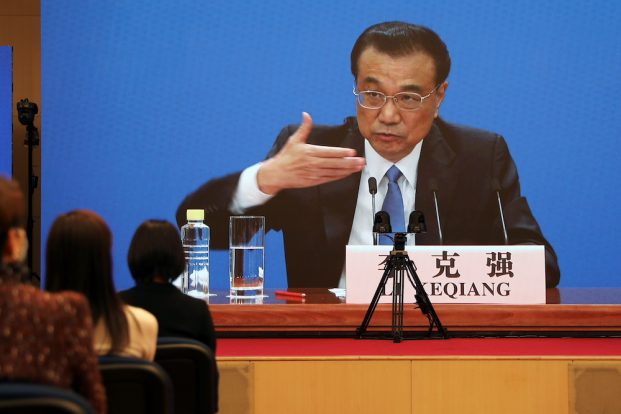China’s Finance Ministry has urged local governments to speed up the issuing of bonds to stabilise the country’s Covid-battered economy.
The Cabinet told provinces on Tuesday to issue $225 billion worth of bonds in June. It has brought forward the deadline for special bond issuance to pay for infrastructure by three months – to ensure the year’s target of issuing 3.45 trillion yuan ($518 billion) is completed by mid-year.
The move comes amid reports that the government faces a growing cash shortfall. Nomura has estimated it faces a funding gap of about 6 trillion yuan (close to $900 billion) because of the plunge in land sales and other tax revenue amid weak factory output.
“The latest wave of Omicron and the widespread lockdowns in place since mid-March have resulted in a sharp contraction in government revenue, including land sales revenue,” Lu Ting, Nomura’s chief China economist, said in a report last week.
National leaders are clearly troubled by the serious economic slowdown and rising unemployment caused by the lockdowns in Shanghai and other cities, as well as factors such as the property sector crisis, soaring inflation in many countries and impacts from the war in Ukraine.
ALSO SEE: Sense of Unease As Shanghai Moves To Lift Covid Lockdown
Raft of Policy Measures
China’s cabinet unveiled a raft of 33 policy measures last week to support the economy, but analysts believe more stimulus will be needed to help jolt the economy back to a sustained recovery.
This means provinces would need to issue nearly 1.5 trillion yuan in coming weeks, based on finance ministry figures showing issuance of 1.85 trillion yuan, or 54% of the total, as of May 27. The funds raised are to be used by the end of August.
The move could increase pressure on market liquidity and compel the central bank to pump out more cash, potentially via the bank’s medium-term lending facility and a reserve requirement cut, analysts at Guosheng Securities said.
The funds raised could be used to support a push to expand into new infrastructure focused on 5G, artificial intelligence and data, analysts said, with returns on traditional projects like highways, railways and airports now much lower.
China’s cabinet said on Tuesday it has approved new types of infrastructure and energy projects.
The ramp-up in infrastructure spending follows a pattern that Beijing has typically followed to boost its economy, although past efforts have led to a number of white elephant projects.
With growing urgency to support an economy handcuffed by Beijing’s zero-Covid policy, Premier Li Keqiang last week reiterated the need to frontload policy support and said China would seek positive year-on-year economic growth in the second quarter.
Many private-sector economists expect the world’s second-largest economy to contract in the April-June quarter, which would be the first since a deep slump in the first quarter of 2020.
More Stimulus Needed
Analysts believe more stimulus will be needed in coming months as Chinese cities ease lockdowns, with the risk that fresh outbreaks could spur further curbs in the absence of a change in China’s broader Covid policy.
Shanghai is lifting movement curbs on most of its 25 million residents from Wednesday.
Meanwhile, policy advisers and thank tanks are stepping up calls for the central government to issue special bonds to help Covid-hit sectors and sustain infrastructure spending in the second half.
“We should actively prepare for it, and the size should be similar to that in 2020,” Jia Kang, head of the China Academy of New Supply-side Economics, said.
“We face severe challenges in achieving the annual growth target, but at least we should strive for it,” said Jia, former head of the finance ministry’s think tank.
Growth Target ‘Out of Reach’
China has set an annual economic growth target of around 5.5% this year but many economists believe that is increasingly out of reach.
The China Wealth Management 50 Forum, a think tank, has called for issuing around 2 trillion yuan in special treasury bonds, based on the need to boost economic growth to 6.5% in the second half to achieve full-year growth of nearly 5%.
Getting the economy back on track takes on added urgency in a sensitive political year, when President Xi Jinping is expected to secure a third leadership term in the autumn.
Guosheng Securities expects 1-1.5 trillion in such bonds, mostly likely to be issued in August and September.
Zhang Ming, senior economist at the Chinese Academy of Social Sciences, a top government think-tank, has said that the government should raise its deficit target to 3.0-3.2% of GDP.
Any moves to raise the budget deficit or issue special treasury bonds would require parliamentary approval while policymakers need to assess the impact from the existing stimulus before taking further actions, policy insiders said.
“The room for infrastructure investment is not big, and we need to avoid duplicate projects and ensure investment returns,” a policy insider said.
In 2020, China issued 1 trillion yuan of special treasury bonds to fund stimulus and shore up the economy that was first hit by Covid-19.
• Reuters with additional editing by Jim Pollard
The headline on this report was amended and further details added on May 31, 2022.
In Numbers: The Economic Impact of Shanghai’s Covid Lockdowns
ALSO SEE:
As China Slows, Economists Train Eyes at Data Fudging – WSJ
China Bans ‘Russian Planes’ Flying Through Its Airspace – Airways
China Factory Activity Decline Slows in May, Data Shows
























